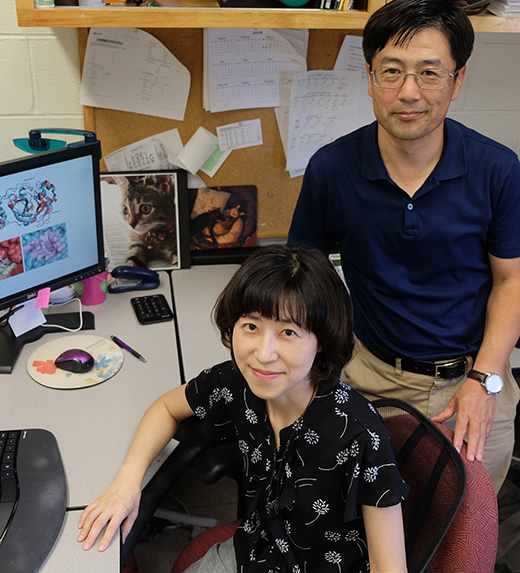09/26/18
K-State Current - September 26, 2018
K-State Current is a weekly news update for the Kansas Board of Regents to apprise the Regents on a few of the many successes and achievements made by K-State faculty, staff and students.

K-State News
State of the University Address
 The Faculty Senate of Kansas State University invites you to the 2018 State of the University address. President Richard Myers will present the address in Manhattan at 3:30 p.m. Friday, Sept. 28, at the K-State Alumni Center.
The Faculty Senate of Kansas State University invites you to the 2018 State of the University address. President Richard Myers will present the address in Manhattan at 3:30 p.m. Friday, Sept. 28, at the K-State Alumni Center.
The university address will be followed by an open forum serving as an opportunity for discussion with President Myers. This event will be video streamed online for those who are not able to attend in person. The link will become active just prior to the event.
If you have questions for Myers but are not able to attend in person, you may email those to facsen@k-state.edu prior to the event. Questions will be presented as time permits.
We look forward to seeing you there.
Kansas State University honored for diversity, inclusion for five consecutive years
Kansas State University remains among the top higher educational institutions in the nation for demonstrating diversity and inclusion.
Insight into Diversity magazine has awarded the university with the 2018 Higher Education Excellence in Diversity, or HEED, Award. Kansas State University has received the award every year since 2014. The university is one of 96 higher education institutions selected for the national honor and the only Kansas institution to receive the designation this year. 
"K-State is an institution that values and champions the contributions, interests and narratives of diverse cultural and social groups," said Bryan Samuel, chief diversity and inclusion officer. "We understand and appreciate the importance of professional and career development that ensures inclusion, engagement and empowerment of all members."
The HEED Award is one of many diversity and inclusion awards recently presented to the university. Honors also include the Campus Pride Best of the Best LGBTQ Friendly Colleges and University award for three consecutive years, the Insight into Diversity Inspiring Programs in STEM Award in 2018, College Choice's 50 Best Colleges for LBGTQ Students in 2017, The Advocate magazine's Top 10 Trans-supportive Colleges in the U.S. in 2017, and a Compete Sports Diversity Award in 2017.
"It is essential to Kansas State University's land-grant mission that we continue to improve diversity and inclusion," said President Richard Myers. "K-Staters have a collective responsibility to help build a community where everyone is welcome. The HEED Award and other inclusion awards the university have received are a testament to our ongoing efforts in uniting the K-State community. Our goal is to graduate world-ready students who understand the power of inclusiveness."
Kansas State University has many diversity and inclusion initiatives, including the KSUnite movement established in November 2017. KSUnite encourages individuals to discuss how to develop an inclusive community, have meaningful conversations and respond to healthy discussion. The university also invests in Project IMPACT, which is designed to recruit, retain and graduate multicultural and first-generation students.
In addition, the university offers numerous student academic success programs such as McNair Scholars and Developing Scholars, and many support services and diversity programs and events for the entire university community.
Kansas State University is among top 30 higher education institutions for inclusion
Kansas State University purple pride is in the most recent ranking from Campus Pride, a national nonprofit that works for a safer college environment for LGBTQ students.
For the second year in a row, Campus Pride lists Kansas State University among its 30 Best of the Best LGBTQ-friendly colleges and universities with the highest ranking, five stars. The university is the only school in Kansas and the only Big 12 Conference school to be included in the 2018 and 2017 listings.
"Our university has worked very hard to achieve a greater understanding of diversity and inclusion," said Brandon Haddock, LGBT Resource Center coordinator. "It is with great gratitude to our students, faculty, staff and administrators who have made these accomplishments possible, especially the Resource Center student staff, our student organizations, and faculty and staff affinity organization."
Kansas State University was given the five-star ranking because it meets benchmarks regarding policy inclusion, support and institutional commitment, academic life, student life, housing, campus safety, counseling and health, and recruitment and retention for LGBTQ individuals. One of the largest strengths for the university is its LGBT Resource Center, which promotes equity, respect, and social justice through programs, outreach and education.
"The LGBT Resource Center helps nurture and support an inclusive environment, which is a key component of Kansas State University's student life initiatives," said Pat Bosco, vice president for student life and dean of students. "This ranking is a tribute to the inviting environment that those in the LGBT Resource Center, supportive organizations and student life have worked hard to provide for all K-Staters."
The university's diversity and inclusion efforts also have been recognized nationally by the SR Education Group, which lists Kansas State University among the 60 accredited institutions on its 2018 Best LGBTQ-Friendly Online Schools. In addition, the university has been consistently recognized with the Higher Education Excellence in Diversity, or HEED, award.
K-State Faculty Highlight
Veterinary researchers and Anivive license antiviral drug for fatal cat disease
 For many cat owners, help is on the horizon with a viral cat disease that can be deadly. A new collaboration at Kansas State University is promoting the commercial development of GC376, an antiviral compound for feline infectious peritonitis, or FIP, which previously has had no effective treatment or cure.
For many cat owners, help is on the horizon with a viral cat disease that can be deadly. A new collaboration at Kansas State University is promoting the commercial development of GC376, an antiviral compound for feline infectious peritonitis, or FIP, which previously has had no effective treatment or cure.
Yunjeong Kim and Kyeong-Ok "KC" Chang, virologists in the College of Veterinary Medicine at Kanas State University, and William Groutas, a medicinal chemist at Wichita State University, have been collaborating since 2006 on the development of antiviral drugs for important human and animal viruses.
"We have been working on antiviral drugs that inhibit a specific virus protease of some important human and animal viruses, and we were able to make very potent inhibitors of FIP," Kim said. "Through collaborative work with Niels Pedersen at the University of California, Davis — including a field trial on feline patients — we became increasingly hopeful that antiviral treatment may one day substantially benefit cats with FIP. Licensing our compound to Anivive Lifesciences is a huge step forward in transitioning our research to commercialization to make this treatment available to the public."
FIP is a progressive and fatal disease caused by a feline coronavirus that can affect both domestic and wild cats. Feline coronaviruses are the cause of viral enteritis, which is typically harmless. But in rare instances, FIP can arise, spread throughout the body and cause death, particularly in cats age 2 and younger.
The licensing agreement was coordinated by the Kansas State University Institute for Commercialization with Anivive Lifesciences, a California company whose proprietary software accelerates the discovery and development process of new pet medicines.
"The team members from Anivive Lifesciences are committed to developing the compound GC376 for the treatment of FIP with a sense of urgency and we look forward to watching their progress over the coming years," said Bret Ford, associate director for licensing at the university's Institute for Commercialization.
"There are many viral diseases that affect human and animals, but antiviral drugs are available for only a number of viruses, and none has been approved specifically for animals," Chang said. "Companion animals are increasingly viewed as part of the family, so the feelings of grief over the loss of their cats by this deadly disease can be devastating and very hard to cope with."
Anivive's founder and CEO Dylan Balsz said, "FIP has long plagued veterinarians and pet owners alike and we look forward to moving this program toward an eventual approval."
"We are very excited to be working with K-State and Dr. Niels Pederson on this very important therapeutic," said David Bruyette, chief medical officer at Anivive Lifesciences. "Having been a faculty member at K-State and a former resident at UC-Davis, where I had the good fortune to work with Dr. Pedersen, makes this collaboration all the more meaningful."
The approval process, overseen by the Food and Drug Administration's Center for Veterinary Medicine, requires several steps documenting the efficacy, safety and manufacturing of the compound. The entire process and time to bring GC376 to market will now accelerate because Anivive Lifesciences and Kansas State University are working together. But researchers say it could take several years before it will be available on the market.
K-State Student News
Research looks at consumer attitudes, emotions to beauty care products
A recent Kansas State University Olathe graduate student applies more foundation to a widespread understanding of the emotions and attitudes behind consumers' purchase of cosmetics, skin care and hair care products. 
The work builds on research from the Center for Sensory Analysis and Consumer Behavior at Kansas State University.
"Emotions frequently factor into purchases and product choice, especially with items that make us feel positive about ourselves, such as beauty care products," said Audra Sasse, July 2108 master's degree graduate in nutrition, dietetics and sensory science at K-State Olathe who conducted some of the preliminary research. "Because of this, companies devote a great deal of resources into understanding how consumers feel about their products and what emotions are driving or stopping these purchases. Such emotional feedback allows for products to be retuned to better meet demands and advertising to be tweaked."
Sasse's report, "Gathering consumer terminology using focus groups — An example with beauty care," is one of the first studies to publicly share information and terminology on the emotions and attitudes consumers have about beauty care products. While beauty care companies have quantified consumer emotions through their own studies, information, results and data collection techniques from these studies are not publicly available.
Although preliminary, the work may lead to the eventual development of a standardized, public scale that measures and tracks consumer attitudes about beauty care products.
Sasse's project built on the preliminary work by Martin Talavera, assistant professor of sensory analysis and consumer behavior at K-State Olathe and Sasse's major advisor.
Using an industry standard practice in sensory testing, Sasse used information from three focus groups to gather broad and specific information about cosmetics, skin care and hair care products. Each group had seven women who fell into the age brackets of 18-35, 36-50 and 51 and older. Each woman regularly used makeup, skin and hair care products. Participants also were asked to bring a photo collage made from magazine ads or illustrations that conveyed how they felt when using beauty products to take care of their face and their appearance. They shared their ideas about beauty care and the benefit expectations they had of those products.
Women in the ages 18-35 focus group said they wanted their beauty products to make them feel "youthful," "happy" and "pretty." They also wanted the application and removal to be as easy as possible for a quick beauty care routine.
Women in the 36-50 age group said they wanted their products to make them feel "clean," "fresh," "ageless" and "confident," while one participant said she felt "powerful" when doing her complete beauty care routine.
Women who were 51 years and older said their beauty care products made them feel "confident," "glamorous" and "happy." One participant said the she could not fall asleep at night if she did not complete her beauty routine, while another said the models in ads targeted to their demographic were too young.
Focus group participants then provided single word responses about how they feel after using their beauty care products versus when not using them. This helped Sasse develop a base-level lexicon for beauty care products and chart positive and negative terminology that helps reveal an overall attitude toward a product.
Responses to wearing makeup included "confident," "pretty," "beautiful," "happy," "polished," "energized," "adventurous," "awake" and "enhanced," while not wearing makeup make the women feel "tired," "exposed," "self-conscious," "naked," "dull," "embarrassed" and "frumpy."
Women said using their skin care products made them feel "clean," "refreshed," "healthy," "protected," "accomplished," "complete," "adult" and "beautiful," while not using the products made them feel "oily," "dirty," "dry," "greasy" and "dull."
Using hair care products made the women feel "clean," "confident," "pretty," "younger," "refreshed," "approachable" and "carefree." Not using these products left them feeling "greasy," "dirty," "oily," "lazy," "self-conscious," "damaged," "embarrassed" and "frumpy."
"What I found is that skin care products are being used more for a health benefit whereas makeup and hair care products are being used more for vanity and looks, making them the more emotion-driven products," Sasse said.
Participants also were asked what ingredients would go into their ideal makeup, skin and hair care products. Answers were unanimously that ingredients should be all-natural, plant-based or water-based and allergen-free. Others wanted products to be cruelty-free in testing and to provide secondary benefits, such as a sun protection factor, vitamins and other anti-aging properties. Participants also wanted their products to be multi-purpose, long lasting and easy to use.
Congcong Zhang, a doctoral student of Talavera's, will build on Sasse's work. That project will look at emotions in a broader demographic using a broader line of beauty care products.